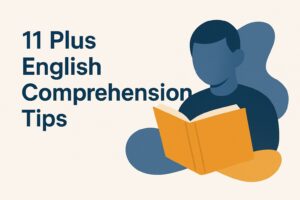
Do Mock Exams Help with the 11 Plus?
The pressure of the 11 Plus can feel overwhelming, but what if there was a way to ease those nerves? Many parents and students ask, Do mock exams help with the 11 Plus?, and the answer is often yes.
These practice tests not only help students become familiar with the exam format but also shine a light on strengths and weaknesses. Curious about how these sessions can impact confidence and performance? Let’s dive into the world of mock exams and unravel their true value in 11 Plus success!
Overview of the 11 Plus Exam
The 11 Plus exam generally evaluates students in subjects such as mathematics, English, and reasoning, utilising both multiple-choice questions and written formats.
In the mathematics section, candidates encounter problems that involve arithmetic, geometry, and algebra. The English portion may include questions on comprehension, grammar, and vocabulary usage.
The reasoning sections typically present verbal and non-verbal puzzles, which assess students’ logic and critical thinking skills.
Different examination boards, such as GL Assessment and CEM, have their own specific criteria; for example, GL tends to focus on familiar scenarios, while CEM places greater emphasis on adaptive questioning.
By understanding these distinctions, students can tailor their preparation effectively, ensuring they refine their skills in alignment with the format of their targeted examination board. As mentioned, the format of the 11 Plus exam varies significantly between boards, and more details can be found in our comprehensive overview of the 11 Plus exam formats for GL, CEM, and others.
Importance of Preparation
Effective preparation for the 11 Plus can significantly enhance a student’s chances of success, with structured study regimens potentially improving performance by up to 30%. To support your child’s preparation, it may be beneficial to implement a comprehensive study plan that allocates dedicated time for each subject.
For example, consider setting aside 60 minutes each day for English practice, utilising resources such as Bond 11 Plus practice papers to focus on specific skills. Additionally, incorporating regular test simulations every two weeks can help identify areas that need improvement; research shows that students who practise under timed conditions often see an average score improvement of 15%.
Encouraging review sessions where students discuss their mistakes can also be advantageous. This collaborative approach has been associated with higher retention rates and a deeper understanding of the material.
Understanding Mock Exams

Mock exams serve to simulate real test conditions, offering students a valuable opportunity to practise as they prepare for the 11 Plus.
These exams help familiarise them with the exam format, making the actual test experience much more manageable.
See also: What Should Be in an 11 Plus Study Plan? to effectively structure your preparation for these exams.
Definition of Mock Exams
Mock exams serve as practice assessments that closely replicate the structure and content of the actual 11 Plus exam, acting as an effective preparatory tool for students.
These practice assessments not only allow students to become familiar with the format and types of questions they will face but also simulate the timing of the real exam. By including timed sections, students can enhance their pacing skills and alleviate anxiety on exam day.
Institutions such as Exam Ninja and resources like Bond Online provide mock exams that can be conveniently completed online.
After taking these assessments, it is beneficial for students to review their performance, as this enables them to identify their strengths and weaknesses, thereby assisting them in targeting areas that require improvement.
Types of Mock Exams Available
There are various types of mock exams available to suit different learning styles, including online assessments, paper-based tests, and group workshops.
Online platforms such as CEM and GL Assessment offer tailored mock exams that adapt to the unique needs of each student. For example, CEM provides interactive assessments that deliver immediate feedback, enabling students to pinpoint their strengths and weaknesses. In contrast, GL Assessment offers comprehensive reports that highlight areas for development, which can help guide targeted study efforts.
For those who prefer traditional methods, paper-based tests remain an effective option, while group workshops can enhance collaboration and foster a deeper understanding through peer interaction.
By combining these different approaches, students can create a well-rounded preparation strategy that caters to their individual learning preferences.
Benefits of Mock Exams for the 11 Plus

Mock exams offer several important advantages, including helping students become familiar with the exam format and improving their examination techniques. For students preparing for specific assessments, understanding what should be included in an effective study plan (our guide to crafting an 11 Plus study plan offers detailed insights) can further enhance their preparation and confidence.
Familiarisation with Exam Format
Taking mock examinations is a valuable strategy for students to become familiar with the structure of the 11 Plus, which helps minimise surprises on the actual test day.
To make the most of these mock examinations, it is advisable to source past papers from reputable websites such as 11plus.co.uk or to utilise online platforms like Tutoring for Excellence.
Regularly scheduling practice sessions and timing them to simulate actual examination conditions will enable your child to develop effective time management skills.
After each mock examination, it is important to review the incorrect answers to pinpoint areas that require improvement.
Additionally, consider online trial tests for further practice. Engaging consistently with these materials not only solidifies understanding but also boosts overall confidence as test day approaches.
Identifying Strengths and Weaknesses
Mock exams play a crucial role in identifying specific strengths and weaknesses, enabling students to focus their improvement efforts on areas that require additional attention.
To effectively analyse mock exam results, students should begin by reviewing their scores in each subject. For a more comprehensive evaluation, tools such as Exam Ninja can prove to be extremely beneficial. This tool not only tracks performance over time but also highlights persistent weak areas. It is advisable to break down performance by section to identify which topics consistently result in lower scores.
As study strategies are adapted, if a student finds that multiple questions on algebra were missed, it may be prudent to increase study time dedicated to that topic or utilise resources like Khan Academy for more focused learning.
Additionally, regularly revisiting mock exam results every few weeks can help ensure that progress is being tracked effectively.
Improving Time Management Skills
Practising with mock exams is an excellent way for students to enhance their time management skills, allowing them to allocate their time effectively during the actual exam.
To truly maximise the benefits of mock exams, it is advisable for students to adopt a few practical strategies. One effective approach is to utilise timer apps such as Focus Keeper or Be Focused to replicate the exam’s timeframe. Setting personal deadlines for each section can instil a sense of urgency—consider aiming to complete sections five to ten minutes early to carve out time for review.
Following each mock exam, it is beneficial to analyse one’s pacing by reviewing the amount of time spent on each question. This reflection not only helps identify areas that may require improvement but also ensures more effective time management during the actual exam.
Psychological Benefits

Along with the academic advantages, mock exams provide important psychological benefits. They play a crucial role in helping students manage stress and build confidence in their abilities.
Reducing Exam Anxiety
Participating in mock examinations can greatly alleviate performance anxiety by offering students familiar experiences prior to the actual test. To maximise these benefits, it is advisable for students to incorporate relaxation techniques before and during the practice examinations.
For example, engaging in deep breathing exercises for five minutes can help calm their nerves. Additionally, using positive affirmations, such as “I am prepared and capable,” can reinforce their confidence.
After the practice examinations, analysing the results is also beneficial; understanding their mistakes fosters growth and diminishes the fear of failure.
Utilising tools like Quizlet can assist students in creating custom mock examinations, allowing them to simulate real exam conditions and practise effectively.
Building Confidence
Mock exams can play a crucial role in enhancing students’ confidence, as regular practice often leads to improved scores in both mock and actual exams.
To fully leverage the advantages of mock exams, it is advisable for students to schedule them at consistent intervals, such as fortnightly, and to meticulously track their results.
Students should analyse which subjects or types of questions present challenges and concentrate their subsequent study sessions on these specific areas.
Utilising tools like Quizlet or Khan Academy can be particularly beneficial for focused practice. Moreover, conducting a thorough review of mistakes helps to solidify understanding and reinforce learning.
Over time, students will likely observe not only an increase in their confidence but also a clearer insight into their strengths and weaknesses as they prepare for the actual exam.
Mock Exams vs. Real Exams

Mock exams do an excellent job of replicating many aspects of the actual 11 Plus exam; however, they differ significantly in terms of pressure and stakes.
This distinction can have an effect on student performance. In terms of preparation strategies, an effective study plan is crucial to ensure students are well-prepared for both the mock and actual exams.
Differences in Experience
The experience of taking a mock examination is generally less stressful than that of a real examination, which allows students to approach their preparation in a more composed manner. This reduced pressure stems from a more supportive environment where students have the freedom to make mistakes without facing immediate consequences.
In contrast, real examinations often induce anxiety due to the high stakes involved and the limited availability of support. During mock examinations, peers and teachers frequently offer encouragement, creating a collaborative atmosphere that is beneficial for learning.
Additionally, students can utilise this opportunity to identify their areas of weakness, as the feedback from practice tests tends to be more constructive and timely. This process not only helps build their confidence but also enhances their performance for the actual testing scenario.
Predictive Value of Mock Exams
Mock exams can be a reliable indicator of actual exam performance, with studies indicating a correlation between mock and actual scores exceeding 70%. To enhance their effectiveness, students should approach mock exams with the same seriousness as the real examinations.
Begin by simulating exam conditions: set a timer for the duration of the test and choose a quiet environment to replicate the testing atmosphere. Once you have completed the mock exam, it is important to conduct a thorough analysis of your performance. Identify the topics where you faced difficulties and prioritise these areas during your study sessions.
Additionally, consider utilising online resources such as Khan Academy or Quizlet to engage in targeted practice. Engaging in discussions about your results with a teacher or peer can also provide valuable insights and strategies for improvement.
How to Effectively Use Mock Exams

To fully capitalise on the benefits of mock exams, students should adopt structured strategies that encompass both study scheduling and thorough results analysis.
Creating a Study Schedule
A well-structured study timetable can effectively incorporate mock exams at regular intervals, allowing for consistent progress as you prepare for the 11 Plus test.
To create an effective study timetable, begin by breaking down the topics you need to cover in the weeks leading up to the exam. It is advisable to study at least five days a week, dedicating 1-2 hours for each study session.
Consider using Google Calendar to designate specific times for each subject, along with reminders for upcoming mock exams. For example, you might schedule your first mock exam three weeks into your study plan.
After the exam, take the time to assess your performance and adjust your focus areas accordingly. This iterative feedback will significantly enhance your preparation process.
Analysing Results
A thorough analysis of mock exam results enables students to identify trends in their performance and adjust their study strategies accordingly. To enhance the review process, it is advisable to use a spreadsheet to track scores across various subjects and topics.
Create columns for the date, score, and specific areas of difficulty.
This approach allows students to visualise their progress over time. Alternatively, one might consider utilising apps like ExamMate, which can generate performance graphs and highlight areas of weakness.
For instance, if a student consistently scores lower in mathematics, they can prioritise additional practice in that subject. Regularly reviewing these results assists in refining one’s study plan, ultimately leading to improved performance.
Incorporating Feedback
Incorporating feedback from mock examinations into study routines can significantly enhance a student’s ability to effectively address knowledge gaps. To make the most of this process, students should first take the time to thoroughly review their mock examination results and identify specific topics that require improvement.
Organising study sessions around these identified weaknesses is essential. For example, if a student found algebra challenging, they might benefit from dedicating two hours each week specifically to practising problems in that area.
Additionally, collaborating with a study group or a tutor can offer new perspectives and explanations, which can help clarify difficult concepts. Utilising resources like Quizlet or Khan Academy can further reinforce learning through engaging quizzes and instructional videos.
Critiques of Mock Exams

While mock examinations offer numerous advantages, they are not without their criticisms. Some individuals express concerns about the stress they can induce and the potential for students to become overly reliant on practice papers as their primary means of preparation.
Potential Stress Factors
Mock exams can unintentionally lead to increased stress, particularly when students feel pressured to achieve perfect scores. To help alleviate this stress, it is beneficial for students to establish realistic goals by breaking down their study material into manageable sections.
For example, dedicating just 30 minutes each day to review a specific topic can facilitate steady progress.
Additionally, incorporating meditation techniques, such as guided sessions through apps like Headspace or Calm, can promote relaxation and enhance focus.
Practising mindfulness during study breaks—by simply taking a few deep breaths—can significantly reduce anxiety and help students remain centred throughout their preparation.
Over-reliance on Mock Exams
While mock exams can certainly be advantageous, relying on them too heavily may hinder comprehensive learning and restrict the development of critical thinking skills. To encourage a well-rounded understanding, it is important to combine mock exams with a variety of study techniques.
Actively reading textbooks and academic journals helps in grasping foundational concepts.
Participating in group discussions can further deepen analysis and provide multiple perspectives on the material. Additionally, considering online platforms such as Khan Academy or Coursera can offer access to interactive tutorials that enrich the learning experience.
Practising problem-solving in a low-pressure environment, without the constraints of an exam, can significantly enhance the retention and application of knowledge. This balanced approach not only prepares individuals for tests more effectively but also fosters a deeper understanding of the subject matter.
Final Thoughts on Mock Exams and 11 Plus Preparation
Ultimately, combining mock examinations with a variety of study techniques creates a well-rounded strategy for excelling in the 11 Plus exam. To fully capitalise on the advantages of mock examinations, it is advisable to schedule them regularly and conduct a thorough review of your performance.
After each mock examination, take the time to analyse any mistakes. This practice not only helps identify areas that need improvement but also builds confidence as you track your progress over time.
Additionally, consider integrating mock examinations with flashcards for your revision, utilising tools like Anki to implement spaced repetition effectively.
Engaging in group study sessions can also be beneficial. Discussing challenging topics with peers can enhance understanding through collaboration. By maintaining a balanced approach and adjusting your strategies based on the outcomes of your mock examinations, you can significantly enhance your preparation efforts.
Frequently Asked Questions
Do Mock Exams Help with the 11 Plus?
Yes, mock exams can be extremely beneficial in preparing for the 11 Plus exam. They provide students with a realistic testing experience, help identify areas of weakness, and allow for practice in time management.
How many mock exams should my child take?
The number of mock exams your child should take may vary, but it is recommended to take at least two or three before the actual 11 Plus exam. This will provide enough practice and allow for any necessary adjustments in studying.
Are mock exams the same as the actual 11 Plus exam?
No, mock exams are not exactly the same as the actual 11 Plus exam. While they may cover similar topics and have a similar format, the questions and level of difficulty may not be exactly the same. However, they still provide valuable practice and preparation.
Can my child improve their score through mock exams?
Yes, mock exams can help improve your child’s score on the 11 Plus exam. They allow for practice and identification of weak areas, allowing for targeted studying and improvement.
Where can I find mock exams for the 11 Plus?
Mock exams for the 11 Plus can be found in various places, such as bookshops, online resources, and tutoring centres. It is important to choose reputable and reliable sources for mock exams.
When is the best time to take mock exams?
The best time to take mock exams is during the later stages of studying for the 11 Plus exam. This will give your child enough time to review their performance, identify areas of improvement, and make necessary adjustments before the actual exam.



